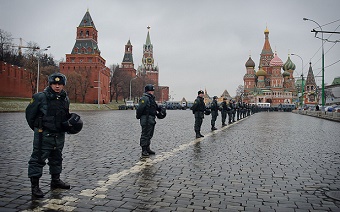


About 90 people will attend the European creation care conference near Nice (France). “Churches have been lacking a vision that puts creation care at the heart of daily discipleship, worship and mission”, says Dave Bookless.

Churches and Christians are called to participate in the Refugee Sunday on June 25. The EEA has joined 18 other NGOs to oppose the current EU discourse on migrations.

“Belief-based intolerance and discrimination of refugees is a pan-European problem”, Christian organisations said during a hearing at the European Parliament.

The far-right nationalism of Le Pen gets 34% of the vote. A legislative election in June will show if the inexpert President will have the support of the parliament.

“Pray for a return of interest in democracy and the emergence of healthy political figures”, says the European Evangelical Alliance. Freedom of speech, one of the main concerns of French Christians.

The European Evangelical Alliance warns about “the growing phenomenon of angry, polarising, post-truth rhetoric that is infecting political debate in many nations, including the Netherlands.”

The EEA joins other 160 civil society organisations in demanding “statesmanship that stands up for humanity and dignity and that addresses people’s fears, instead of fuelling them.”

Anger and fake news are “poisoning society and making it harder to understand what is really going on”, says EEA Socio-political representative Julia Doxat-Purser.

After 10 years, Christel Lamère Ngnambi will leave his position to pursue a PhD. Advocate for religious freedom, Arie de Peter will take over the role.

The European Evangelical Alliance publishes a press release: “When a Pope understands Luther better than many Protestants do”.

More than 20 countries were represented at the European Evangelical Alliance General Assembly 2016. The “identity of Europe” and the Christian response to several challenges was discussed in Colares (Portugal).

More than 50 representatives from diverse backgrounds and regions met in Barcelona for an “open process, listening to God and listening to each other for what we feel is on God’s heart for Europe”.

Have you contemplated what it means that the refugee migrants are going to stay in Europe, your country, your town, your village? Or are you deep down still thinking and maybe even hoping that they will go away again?

“Is the gospel about human salvation from a condemned world or does it include hope for creation’s good future in Christ?” Lausanne Movement and World Evangelical Alliance sponsor the regional gathering.

The law that makes evangelism illegal has come into force in Russia, on Wednesday 20th July. The situation is still better than in the URSS days, says evangelist Alex Jaruchik.

“Russian Evangelicals are not problematic and radicalised citizens and they should not be treated that way”, says Thomas Bucher, the General Secretary of the European Evangelical Alliance.

“The European Evangelical Alliance is extremely concerned about Russia’s new anti-terrorism law, which greatly restricts religious freedom”. Evangelism is no longer allowed outside religious buildings.

“Factors that increase the risk for refugees in Europe are denial of asylum, criminal activity inside the camps, unsafe living situation, minority status and isolation”, the European Freedom Network explained in a webinar.

A report launched by the EU Intergroup on Freedom of Religion or Belief analyses the restrictions in 53 countries. “Human rights should not be a hobby, they should be a core task for a diplomat.”

The European Evangelical Alliance calls to pray for the referendum.

On June 19 and 26, many churches will spend a day to pray “for the welfare and protection of the world’s forcibly displaced peoples”. Ideas and resources are offered.

Some of the ways that evangelical organisations are taking up the global challenge of implementing creation care as a mission task.

What should be the approach to refugees coming from an Arabic background? What is important to them? How can we talk to them about God? Usama Hanna (MEOS, Switzerland) gives some answers.

The European Evangelical Alliance (EEA) welcomes the appointment. President Juncker announced that the former Education commissioner Jan Figel’ will take on a one year mandate.

What can members of local churches do to welcome asylum seekers living in their region? Robert Strong (Netherlands) suggests some easy steps we can follow.

Las opiniones vertidas por nuestros colaboradores se realizan a nivel personal, pudiendo coincidir o no con la postura de la dirección de Protestante Digital.